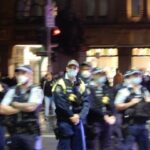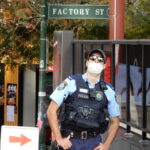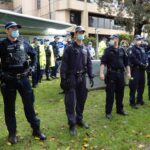Politicised Policing in NSW Sees Bail, Remand and Adjournments Used to Silence Dissent
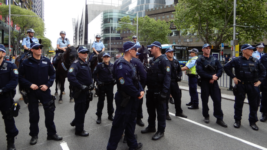
Right now, in this country, as is happening elsewhere across the planet, those who are defending climate and mobilising against destructive greenhouse gas emitting industries are being demonised and criminalised in an effort to see the public disregard them as their rights are being violated.
In NSW, what’s become apparent 12 months after the enactment of an excessive antiprotest regime and its outcomes, is that criminal justice measures have been reconfigured into a system of punishment, which utilises bail conditions, remand and adjournments to stamp out climate protest.
A key example is the case of Violet CoCo. The climate defender was sentenced to 15 months for the unauthorised obstruction a bridge.
The public outcry over her punishment was immense, and was subsequently dropped on appeal, but she’d already spent 100-odd days under “virtual house arrest” as a result of her bail conditions.
The backlash against her sentencing, however, doesn’t indicate the authorities simply bungled their way into using criminal justice mechanisms as an alternate to shut down the climate movement, as they’ve been employed in a targeted manner designed to cause the campaign the most harm.
And another case in point is the one pertaining to activist Margaret Pestorius, as her matter, which involves alleged participation in a Sydney climate protest and being arrested a day later, has again been adjourned until December, dragging her matter out for about 18 months by year’s end.
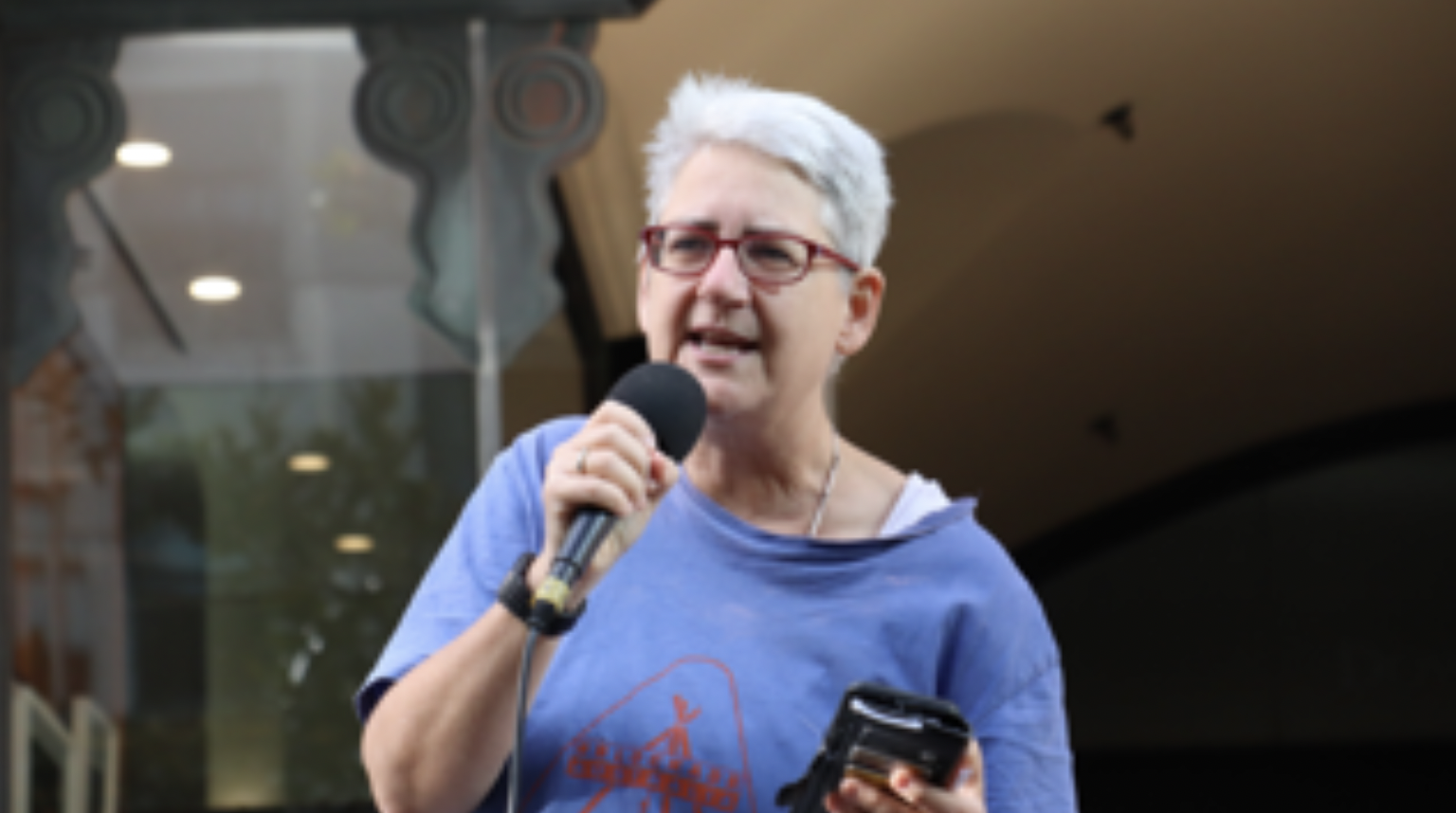
Gathering denied
“I’m just an ordinary person who takes part in political life,” Pestorius told Sydney Criminal Lawyers. “I cooperate with people to live a life that includes participating in the big conversations of our time, speaking out about war and the terrible effects of climate change. It’s our duty.”
“The whole thing about so-called peaceful assemblies, which are codified and protected by the UN in article 21 of the International Covenant on Civil and Political Rights (ICCPR) is that they refer to ordinary people simply gathering,” the activist continued.
But it’s peaceful assemblies that both sides of NSW politics have acted to quash. Under the 2022 established antiprotest regime, unauthorised gathering in a manner that obstructs roads, bridges, tunnels or major facilities can see an individual imprisoned for up to 2 years and/or fined $22,000.
In protecting peaceful assembly, ICCPR general comment 37 sets out that they can occur outdoors, indoors or online, that they can include protests, meetings, processions and vigils, that they cannot involve violence, and that the state, including police, should facilitate safe peaceful assemblies.
“In fact, it was announced at my trial by a senior officer that the police do not have different protocols for assemblies and processions that they know about and are able to prepare for assemblies and processions that they don’t know about,” Pestorius underscored.
A targeted approach
Pestorius’ case is one amongst many that were initiated a year ago, following an uptick in disruptive direct actions alerting the public to the climate crisis. And part of the state’s response to the rise in demonstrations was to establish the multi-million-dollar Strikeforce Guard to target climate activists.
The antiprotest laws were enacted in April last year. And it became apparent around the time of a series of actions planned by Blockade Australia late last June, that the climate-focused police unit had been compiling intelligence packages relating to those it presumed to be key activists involved.
This was clear, initially, as officers carried out a series of pre-protest home visits warning potential demonstrators to stay away from events. And as the criminal cases of those then charged have proceeded, these intel packages have been referred to and produced in court.
“It’s extraordinary that they’re using intelligence packages on us,” Pestorius made clear. “For a start, I’m from Queensland, not NSW, and I’ve spent little time there.”
“It brings up the question about how they got them and what’s in them,” she added. “It seems that NSW police are the new ASIO.”
The appearance of intelligence packages supports the position that NSW police has not merely been attempting to prevent lawbreaking, but rather it’s specifically targeted prominent activists, in order to put them out of action, in an attempt to break the climate defence movement.
“Bail controls”
The adjournment of Pestorius’ case for a further seven months reveals how court processes can be used to disable activists. And while they’re remanding has been another deterrence, the key measure that climate defenders have most complained about has been the use of bail conditions.
“The bail controls are an excuse to police ordinary people. Without bail controls, police may not be allowed to follow us, or certainly would not be able to suddenly incarcerate us.,” Pestorius maintains. “They are using lists, like the old ASIO days.”
Climate activists have been raising the issue of extreme bail conditions since spring 2019 Extinction Rebellion demonstrations. And these restrictions have included bans on associating with lists of people, bars on entering certain areas, restrictions on the use of encryption and daily police checks.
During one of her court appearances, Pestorius’ lawyer was able to have her bail conditions dropped potentially because they did not align with United Nations standards. Indeed, the activist outlines that these types of restrictions violate protections set out under the ICCPR and the Australian Constitution.
“High-level police know that their policing is supposed to align with these two documents, and where it doesn’t, it’s liable to challenge,” she assured. “Most of the magistrates know it. And probably all the District Court judges do too.”
Bipartisan policing
“The NSW court system is a shambles,” remarked Pestorius. “The police have way too much power, and they use the chaotic nature of the system to hide their political moves.”
“The police are not supposed to be a political entity, but what we have now is police set up as a secret undercover force targeting people organising around climate and anti-militarism issues.”
The resident of Queensland is not the only climate activist to have come to the conclusion that NSW police is operating in a collaborative manner with the state government – whether that be Liberal or Labor – in order to crush the climate movement on behalf of fossil fuel industry sponsors.
Pestorius’ case is just an example of how these justice measures are being used to dismantle a social movement. In fact, she had to wait 10 months to first appear in court, and even without bail conditions, her case will now weigh heavily for a further 7 months after its recent adjournment.
“Bail becomes a policing plan,” she continued. “It’s not actually about bail concerns and maintaining the integrity of the court case. The misuse of the Bail Act enables police to keep ordinary people on numbers of spurious bail controls that they can pull in at any time.”
And the clear proof that the authorities have been applying measures – that are supposed to facilitate the running of a case or promote justice itself – as weapons to silence climate dissent, is that since these methods have been utilised, the desired chilling effect has been achieved.
The force that the climate defence movement had built up to a year ago, has since been subdued.
However, recent weeks have seen a growing momentum as activists have commenced utilising broader disruptive measures that minimise police ability to crack down upon them so harshly.
“What we are seeing in NSW and in Western Australia is state police organising as a political entity, using politicised taskforces that are able to use common mechanisms in the criminal justice system to hobble activists,” the ardent social justice advocate warned in conclusion.


